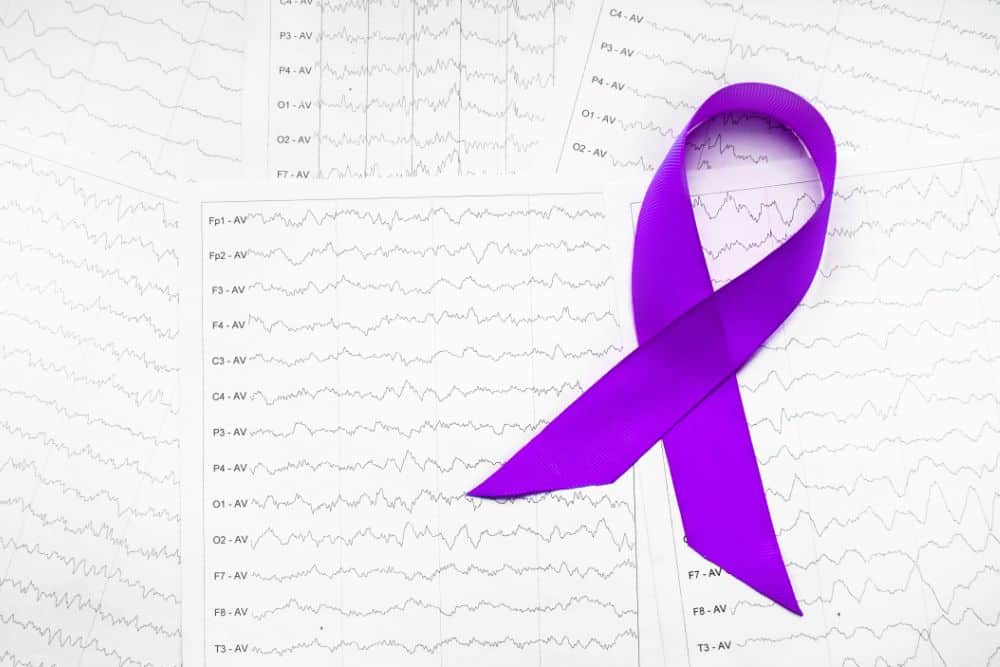In recent years, medical marijuana has become the subject of interest for many researchers and patients suffering from various ailments, including epilepsy. In this article, we will focus on the use of medical marijuana in epilepsy therapy. Can medical marijuana be a way to bring relief to patients struggling with epilepsy?
What will you learn from this article?
👉 What are the causes and main symptoms of epilepsy?
👉 Can medical marijuana prove to be a support for people suffering from this disease?
👉 How can medical marijuana be used during the treatment of epilepsy?
👉 What do studies say about the use of medical marijuana in epilepsy therapy?
Table of contents:
- Epilepsy – causes of the disease
- Symptoms of epilepsy
- Medical marijuana and epilepsy – key information
- The effectiveness of medical marijuana in treating epilepsy
- Epilepsy – medical marijuana may influence the course of the disease
- There are many ways to treat epilepsy
- Supporting epilepsy treatment with medical marijuana
- Potential benefits of using medical marijuana
- The future of medical marijuana in epilepsy treatment
- Summary
Epilepsy – causes of the disease
Epilepsy is a neurological disease characterized by recurring epileptic seizures, which result from disturbances in the electrical activity of the brain. The causes of epilepsy can be diverse and are not always clearly defined.
In some cases, epilepsy may have a genetic predisposition, where mutations in specific genes may be the cause of the disease. Other causes of epilepsy may include brain damage caused by injuries, encephalitis, brain tumors, congenital defects, brain hypoxia during birth, or even abnormal brain structure.
The fundamental mechanism of epilepsy occurrence is excessive neuronal excitability in the brain, which leads to excessive discharge of electrical impulses and the formation of epileptic seizures.
Symptoms of epilepsy
The symptoms of epilepsy can vary depending on the type and course of the disease and the area of the brain that is involved in the seizures. Below we present the most common symptoms of epilepsy:
👉 Epileptic seizures
Symptoms of epilepsy can take various forms, such as:
- Partial seizures: Manifest as sudden and abnormal behavior, muscular convulsions, sensory or psychic disturbances.
- Generalized seizures: Manifest as loss of consciousness, muscle stiffness, involuntary movements, sudden falls, or involuntary urination.
👉 Mental disorders
People with epilepsy often experience mood changes, anxieties, and depression, as well as difficulties with concentration and remembering information.
👉 Neurological disorders
May include tremors, problems with balance and coordination, difficulties in speaking, or loss of sensation.
Symptoms of epilepsy can vary among individuals. In case of suspected epilepsy, consultation with a doctor is necessary, who will conduct appropriate diagnostic tests and establish a treatment plan.
Medical marijuana and epilepsy – key information
Medical marijuana contains chemical compounds known as cannabinoids, of which the most important are delta-9-tetrahydrocannabinol (THC) and cannabidiol (CBD). THC is responsible for the psychoactive effects of marijuana, while CBD does not produce psychoactive effects. However, both substances have the potential to influence the electrical activity of the brain, which is crucial in the treatment of epilepsy.
According to studies conducted by Devinsky [1], CBD has shown effectiveness in treating seizures in patients with Dravet syndrome, a rare form of treatment-resistant epilepsy. Furthermore, research by Devinsky [2] demonstrated that adding CBD to standard therapy benefits patients with severe epilepsy associated with Lennox-Gastaut syndrome.
👩⚕️ The effectiveness of medical marijuana in treating epilepsy
Clinical trials have shown that medical marijuana can have a beneficial impact on the control of epileptic seizures. According to studies by Gloss [3], CBD exhibits moderate to strong effectiveness in reducing the frequency of seizures in patients with various forms of epilepsy. These results are consistent with the findings of other studies, which also suggest benefits associated with the use of medical marijuana in treating epilepsy.
However, it is important to note that the effectiveness of medical marijuana may vary depending on the individual characteristics of the patient. Some patients may experience more improvement than others. It is important to conduct regular consultations with a doctor and monitor the effects of therapy to adjust dosages and treatment strategies.
Medical marijuana is opening new doors for the treatment of epilepsy, offering hope where traditional remedies may fail. Its ability to reduce the frequency and intensity of epileptic seizures may present new opportunities for patients.
Lucas Cysewski – CEO and founder of VapeFully
Epilepsy – medical marijuana may influence the course of the disease
Medical marijuana can influence the course of epilepsy in several ways. Primarily, cannabinoids contained in marijuana, such as CBD, have anticonvulsant properties that can help control epileptic seizures. By affecting the endocannabinoid system in the body, medical marijuana can regulate brain electrical activity, reducing the excessive neuronal excitability responsible for seizures.
Additionally, medical marijuana exhibits anti-inflammatory properties. Epilepsy often involves inflammatory processes in the brain, which can contribute to the intensification of symptoms. By reducing inflammation, marijuana can alleviate accompanying symptoms and improve the overall functioning of the patient.
However, it should be noted that the impact of medical marijuana on the course of epilepsy may vary depending on the individual characteristics of the patient. Each body reacts differently to cannabinoids, therefore it is important to monitor the effects of therapy and adjust the dosage based on individual needs.
There are many ways to treat epilepsy 🩺
It is also important to emphasize that medical marijuana is not the only method of treating epilepsy. There are many other therapeutic options, such as traditional antiepileptic drugs, the ketogenic diet, or surgical procedures. The decision to use medical marijuana should be made in cooperation with a specialist doctor, who can assess the benefits and risks associated with its use.
Medical marijuana, due to its anticonvulsant and anti-inflammatory properties, can have a positive impact on the course of epilepsy. Cannabinoids contained in marijuana can help control epileptic seizures and reduce inflammation associated with the disease.
Each case of epilepsy is unique, therefore it is important to consult with a doctor before starting therapy with medical marijuana and to monitor its effects during treatment.
Supporting epilepsy treatment with medical marijuana
Medical marijuana can be used as a supplement to other forms of epilepsy treatment to maximize the efficacy of the therapy. How can medical marijuana support epilepsy therapy?
✅ Collaboration with a doctor
In the case of treating epilepsy with medical marijuana, it’s important to maintain close cooperation with a specialist doctor. The doctor can adjust dosages, monitor progress, and assess whether the therapy is effective and safe.
✅ Choosing the right medication
There are many different strains of medical marijuana, containing various ratios of cannabinoids, such as CBD and THC. Some strains may be more effective in alleviating epilepsy symptoms. By working with a doctor and specialists, it’s possible to select the appropriate medication that best suits the individual needs of the patient.
✅ Monitoring effects and side effects
During medical marijuana treatment, it’s important to regularly monitor the effects of the therapy and any potential side effects. The patient and doctor should track the frequency and intensity of epileptic seizures, as well as evaluate the overall well-being and functioning of the patient.
✅ Education of the patient and the family
The patient and their family should be properly informed about medical marijuana, its effects, possible side effects, and potential benefits. It’s important to have a full understanding of the therapy and to be aware of any legal and regulatory issues related to medical marijuana.
Medical marijuana can provide valuable support in the treatment of epilepsy; however, it should be remembered that each case of epilepsy is unique, and the body’s response to medical marijuana can vary.
Potential benefits of using medical marijuana
Beyond reducing the frequency and intensity of epileptic seizures, medical marijuana can offer other benefits to patients suffering from epilepsy. According to studies conducted by Rosenberg [4], CBD may have anti-inflammatory effects, which can help in reducing inflammation associated with the disease. Additionally, medical marijuana can alleviate accompanying symptoms, such as anxiety, depression, or concentration difficulties.
The future of medical marijuana in epilepsy treatment 🔬
Given the promising research results, medical marijuana is gaining increasing recognition among doctors and patients. Nonetheless, further research is needed to understand the full potential of medical marijuana in epilepsy treatment. Legal regulations are also necessary to ensure appropriate conditions for using medical marijuana as a therapy for patients with epilepsy.
Summary
Medical marijuana has the potential to play a significant role in the therapy of epilepsy treatment. Research indicates the beneficial impact of marijuana on the control of epileptic seizures, as well as on the reduction of inflammation and alleviation of accompanying symptoms. These results are consistent with scientific findings conducted by various researchers. Increasing awareness about medical marijuana in epilepsy therapy treatment is key to providing patients with appropriate treatment options and improving their quality of life.
Bibliography:
- Devinsky, O., Cross, J. H., Laux, L., Marsh, E., Miller, I., Nabbout, R., Scheffer, I. E., Thiele, E. A., Wright, S. (2017). Trial of Cannabidiol for Drug-Resistant Seizures in the Dravet Syndrome. The New England Journal of Medicine, 376(21), 2011-2020. https://pubmed.ncbi.nlm.nih.gov/28538134/
- Devinsky, O., Patel, A. D., Cross, J. H., Villanueva, V., Wirrell, E. C., Privitera, M., Greenwood, S. M., Roberts, C., Checketts, D., VanLandingham, K. E., Zuberi, S. M. (2018). Effect of Cannabidiol on Drop Seizures in the Lennox-Gastaut Syndrome. The New England Journal of Medicine, 378(20), 1888-1897. https://pubmed.ncbi.nlm.nih.gov/29768152/
- Gloss, D., Vickrey, B. (2019). Cannabinoids for Epilepsy. Cochrane Database of Systematic Reviews, 3, CD009270. https://pubmed.ncbi.nlm.nih.gov/24595491/
- Rosenberg, E. C., Tsien, R. W., Whalley, B. J., Devinsky, O. (2017). Cannabinoids and Epilepsy. Neurotherapeutics, 14(3), 747-768. https://pubmed.ncbi.nlm.nih.gov/26282273/










